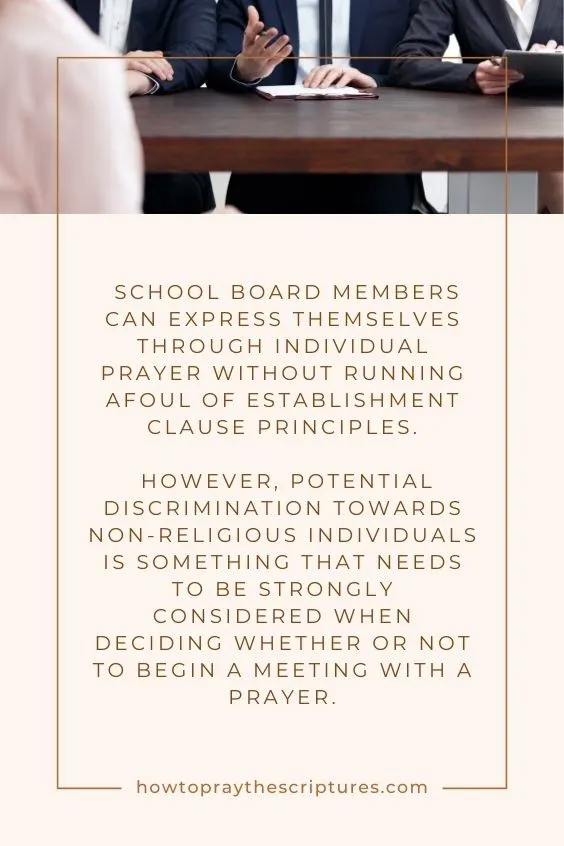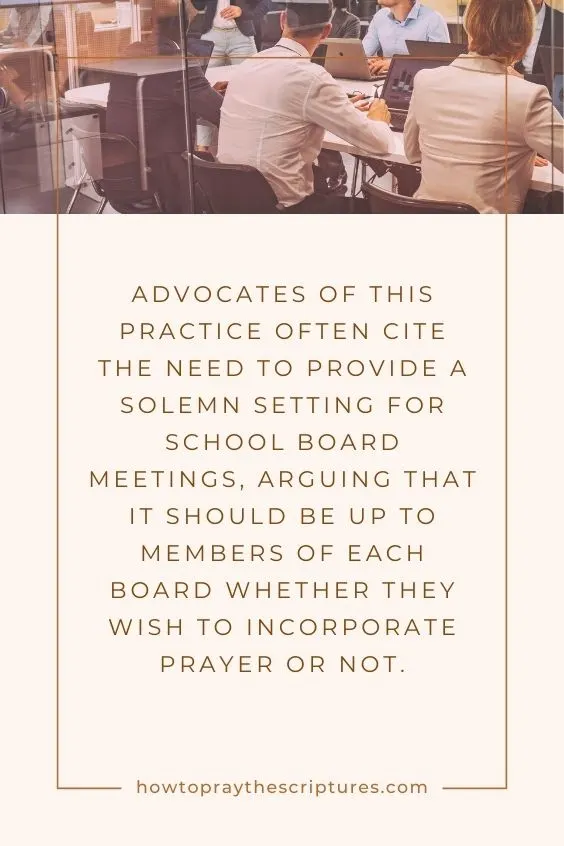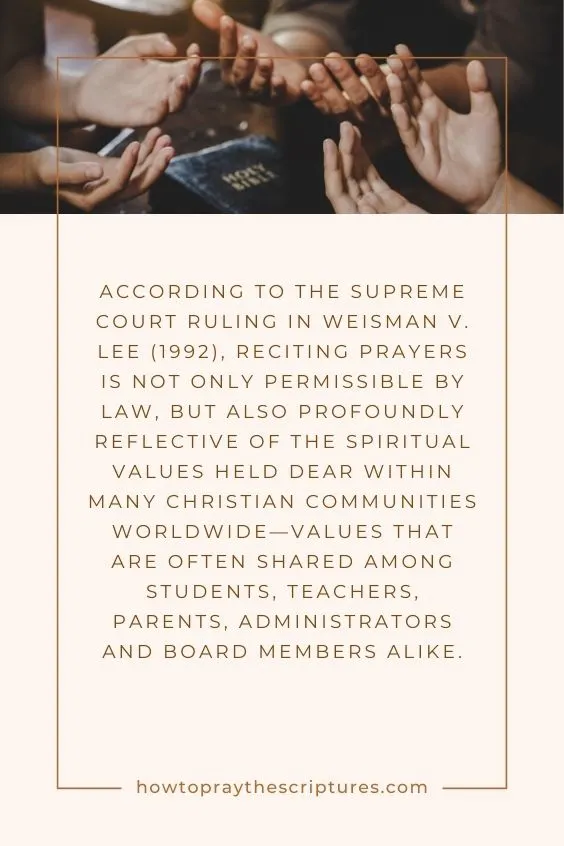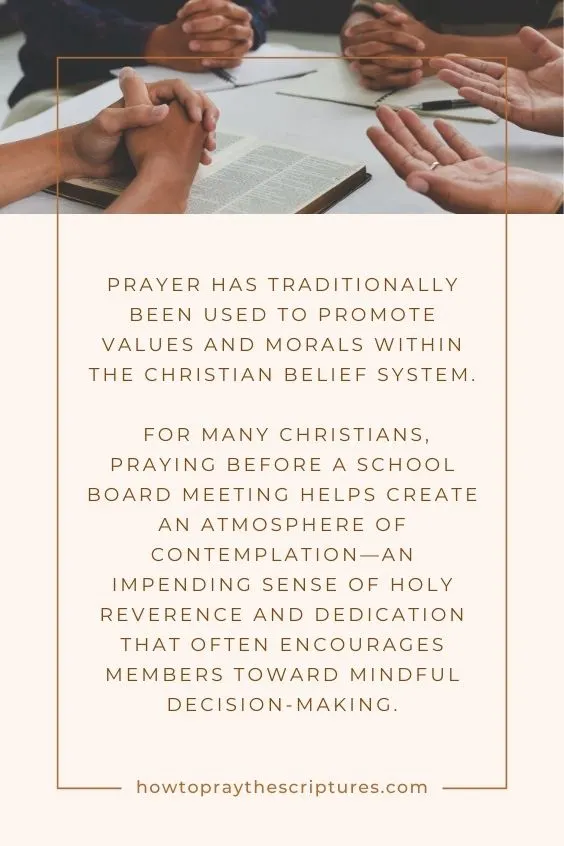With the issue of school board prayer stirring intense debates across the nation, it is crucial to have a broader understanding of its legal and social implications. Prayer at school board meetings raises complex questions about religious infringement on public education, as well as First Amendment protections for free speech and spiritual exercise for students and faculty members.
For over 50 years, Supreme Court decisions, such as Lee v. Weisman, have determined that including prayers in public schools could be seen as a form of establishment of religion. By exploring these issues further, this blog post seeks to provide an authoritative overview on whether or not school board meetings can begin with prayer, while considering legal precedence on all sides of the conversation, so let’s dive in!

Can School Board Meetings Begin With A Prayer?
Legal Precedents for School Board Prayer

Can School Board Meetings Begin With A Prayer?
For decades, there have been ongoing debates about prayer in schools and its impact on religious expression. While the Supreme Court ruling in Weisman v. Lee has set guidelines for prayer at school board meetings, the debate is far from settled, as evidenced by cases such as the Ninth Circuit’s ruling on prayer at a school board meeting in Chino Valley Unified School District V.
Supreme Court ruling in Weisman v. Lee
The Supreme Court’s decision in Weisman v. Lee (1992) declared that school-sponsored prayer at public school events, even when it is non-sectarian and voluntary, constituted a violation of the Establishment Clause of the First Amendment.
In this case, the plaintiff’s parents argued that their daughter had been subject to unconstitutional religious coercion by being present for prayers issued from her public high school platform.
The court found that allowing such prayers sent an official message that endorsed religion over nonreligious belief systems as valid philosophies that students must reflect upon during public ceremonies like graduations.
Ninth Circuit ruling on prayer at school board meetings
The Ninth Circuit Court of Appeals confirms that school board members have certain limited freedoms to pray before, during, or after their meetings. The court made this ruling in response to a case where parents claimed that prayer at school board meetings violated the Establishment Clause of the Constitution.
In making its decision, the court established three rules related to prayer at schools: it must be initiated by individuals acting in their private capacity and not as official representatives; it cannot proselytize or advance any particular faith; and participation should remain voluntary for all participants.
Based on these guidelines, school board members can express themselves through individual prayer without running afoul of Establishment Clause principles. However, potential discrimination towards non-religious individuals is something that needs to be strongly considered when deciding whether or not to begin a meeting with a prayer.

Can School Board Meetings Begin With A Prayer?
Fourth Circuit ruling in Wynne v. Town of Great Falls
In Wynne v. Town of Great Falls, the Fourth Circuit issued a ruling that pleaded with the First Amendment to ban Christian prayer in government meetings. The plaintiff’s complaint alleged that since 2017, every single invocation at the public Town Council Meetings primarily consisted of explicit references to Jesus Christ and was, therefore, considered an unconstitutional endorsement of Christianity by the government.
While dissenting arguments asserted that not all prayers necessarily give preference to any particular religion or amount to promotion thereof, such claims were dismissed when it was found that nearly 95% of council invocations contained religiously specific statements before ending with “in Jesus’ name.” In its conclusion, the court unanimously agreed upon reasoning for why this specific situation violated bedrock constitutional protections against the religious establishment: expressing spiritual admiration towards one faith over another, while still being supported financially through taxes, poses a coercive imposition on freedom of conscience.
Arguments in Favor of Beginning School Board Meetings with Prayer

Can School Board Meetings Begin With A Prayer?
Advocates of this practice often cite the need to provide a solemn setting for school board meetings, arguing that it should be up to members of each board whether they wish to incorporate prayer or not.

Can School Board Meetings Begin With A Prayer?
Additionally, some feel that incorporating religious elements sends a powerful message about upholding shared values and morals.
Tradition and solemnity
Prayer has long been used at the beginning of school board meetings as a way to infuse solemnity and depth into the proceedings. This was historically intended to bring humility, reverence, and respect for the occasion on which important decisions are made on behalf of a community’s public education system.
According to the Supreme Court ruling in Weisman v. Lee (1992), reciting prayers is not only permissible by law, but also profoundly reflective of the spiritual values held dear within many Christian communities worldwide—values that are often shared among students, teachers, parents, administrators and board members alike.

Can School Board Meetings Begin With A Prayer?
Although prayer may be used intentionally as an opportunity for spiritual grounding and focus during school board meetings, it does not necessarily reflect any particular religious dogma, nor does it pose any threat toward those who do not subscribe to its theology; ultimately, this serves as an occasion meant to instill unity amongst a diverse population through recognizing its common values using symbolism embraced across various faith traditions.
Freedom of speech and religion for board members
The First Amendment of the United States Constitution guarantees freedom of speech and religion to all citizens, including school board members elected to serve in their districts.
Several Supreme Court cases have established that prayer at public meetings may be permissible under certain conditions, so long as the practice does not constitute government sponsorship or endorsement of any particular faith.
Promoting values and morals
Prayer has traditionally been used to promote values and morals within the Christian belief system. For many Christians, praying before a school board meeting helps create an atmosphere of contemplation—an impending sense of holy reverence and dedication that often encourages members toward mindful decision-making.

Can School Board Meetings Begin With A Prayer?
It also invites spirituality into policymaking, allowing for divine guidance in determining how best to protect student safety and well-being. Activities such as Bible study or Scripture reading are positive reinforcement methods through which Christian principles can be instilled into students’ lives. Should prayer be conducted publicly at board meetings, it could serve as a way to inspire similar moral lessons among teachers, administrators, parents, and other stakeholders in the educational community.
Prayer may also encourage stronger relationships between church leaders and public school districts by providing opportunities for collaborative services, such as counseling or extracurricular spiritual activities, allowing schools to apply core principles from Christianity into their own code of ethics.
Arguments Against Beginning School Board Meetings with Prayer
While participants may believe that beginning school board meetings with prayer is a traditional aspect of many communities, some are also concerned about the potential implications of breaching the separation between church and state or excluding or discriminating against certain individuals due to their beliefs.
Separation of church and state
The separation of church and state is a legal principle enshrined in the First Amendment and other parts of the Constitution. This principle protects individual religious freedoms by prohibiting public institutions from sponsoring, supporting, or interfering with particular religions.
An important part of this protection ensures that individuals can practice religion freely without fear of being coerced into participating in others’ activities or ideas against their will.
In considering prayer at school board meetings, the Supreme Court has made it clear that government-led prayer carries an inherent risk for those who do not participate due to their faith or lack thereof.
These members may worry that they are subject to social pressure in such contexts, whether intentional or unintentional, thus violating freedom from the establishment clause under which American citizens are legally protected, as defined by prior case law rulings like Weisman v Lee (1992).
Potential influence on students
In the wake of Weisman v. Lee, circuit courts have ruled on a case-by-case basis to allow school board meetings to begin with prayer, so long as it does not infringe upon students’ rights or create an atmosphere that is deemed coercive.
Depending on how this prayer is delivered and what religious values are expressed by board members, there can be potential implications for student participation in classes and activities related to their coursework.
As school boards represent many students from different backgrounds and relationships with faith or lack thereof, opening prayers may send an exclusionary message to those who do not follow the religions being represented at meetings.
Furthermore, these prayers could potentially influence students’ perception of religion, along with any morals and values referenced in them—such as respecting authority figures or honesty—despite efforts by officials to set up safeguards against such activity.
Conclusion
School board meetings beginning with prayer can be a contentious issue, raising legal and constitutional questions that may not have clear answers. It is possible to balance personal religious freedoms with the separation of church and state when aiming for neutral classroom environments in public schools.
In addition, though it may share features similar to legislative prayer, courts should reject findings that school board meeting prayers are subject to the same exception under the Establishment Clause.
At its core, this issue raises questions of balancing liberty interests while ensuring non-discrimination towards all students, regardless of their faith tradition or lack thereof. It is important to consider both sides of the argument in order to establish policies that respect individual rights within appropriate confines determined by our laws and forbid any acts or policies deemed coercive towards students or religiously motivated discrimination.
FAQs
1. Does the U.S. Supreme Court allow school board meetings to begin with a prayer?
In 1983, the U.S Supreme Court ruled that schools could not initiate an obviously religious exercise such as prayer in Marsh v. Chambers; however, they have also allowed for silent prayer or moments of silence before meetings, as shown in the Doe v. Indian River School district case, where no violation in the 2002 case was found.
2. What are student rights regarding the use of politics and religion during school board meetings?
School Board Meetings should be free from all forms of coercion designed to influence students on political and religious matters, per Abington Township School District v. Schempp, which is part of the 1963 S.Ct landmark decision that separately banned bible readings, and said that prayers audibly recited over microphones at public schools were unconstitutional violations of both the Free Speech clauses (1st Amendment) and Establishment Clauses (14th Amendment).